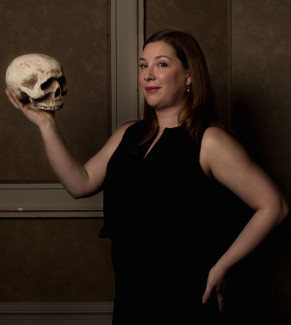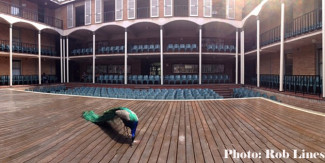
Johns Hopkins UniversityEst. 1876
America’s First Research University
Shakespeare Bulletin On the Move

Earlier this year, Shakespeare Bulletin editor Kathryn Prince moved from the University of Ottawa to the University of Western Australia, where the journal's editorial offices will be housed the Centre for Medieval and Early Modern Studies. Prince joined us for a Q&A about her move as well as updates on the quarterly journal.
You have made a big transition from Ottawa to Australia while continuing to lead Shakespeare Bulletin. What has that been like?

Our biggest challenge at the moment is language. Shakespeare Bulletin follows the conventions of American spelling, but I’m a Canadian based in Australia, the book reviews and performance reviews editors (Sarah Dustagheer and Peter Kirwan) are based in the UK, our contributors hail from wherever English is spoken, and we’re all focused on an English playwright whose spelling is anything but conventional. My wonderful French-Canadian editorial assistant Anne Sophie Voyer submitted her PhD and began a full-time job just as I was leaving Canada, so I’m currently in the process of recruiting an Australian editorial assistant willing to become fluent in American. When all the -re/-er, our/or, and –ise/-ize words start to look wrong no matter how they’re spelt (spelled?), I know it’s time to call it a day!
How exciting is it to be in Perth where there is a replica of the Fortune Playhouse, a theatre used by Shakespeare’s competitors?
It’s utterly thrilling! I first visited the University of Western Australia three years ago on a fellowship. I was entranced by the New Fortune Theatre, a replica of the Fortune Playhouse. The New Fortune was built as the result of an amazing subterfuge, when an enterprising academic on the planning committee for the new Arts building managed to get the university to approve blueprints that just happened to include a courtyard with the exact same dimensions as the Fortune. The courtyard gained a stage that was, at one time, a thriving site of performance, teaching, and research. In recent years it has been more or less ceded to the campus’s ostentation of peacocks (I love that collective noun!), who screech territorially whenever someone dares to stage a production.

Since my own work on Shakespeare in performance has been moving in the direction of practice-as-research, when I was here in 2016 I immediately saw the potential of this space and began to fantasize about using it as a laboratory / classroom / playground. My dream has come true! This year I’m teaching a course that uses the New Fortune as one of its teaching spaces, and I’m helping my colleagues Brid Phillips and Steve Chinna with a series of “Renaissance Moved Readings” that welcome all comers to the stage for an informal, script-in-hand performance. I have a new project, Fortune’s Favourites (spelled the Australian / Canadian / British way!), using the New Fortune to workshop all of the plays that were performed at the original Fortune.
I’ve had a longstanding interest in how theatrical space affects performance choices, and this is the perfect opportunity to put some of my theories into practice. Just to be safe, I offer a friendly greeting to the peacocks every morning as I stroll through the New Fortune on the way to my office, hoping to cultivate a neighborly relationship.
The Winter 2018 issue featured a number of longer articles than previous issues. How important is it to mix things up like that?
It’s not unusual for me to receive submissions that exceed the normal “6,500-9,000” words we indicate in our author guidelines. Usually I can work with the author to trim some excess, but sometimes the extra length is necessary to the argument. If a piece is important and worth publishing in all its wordy glory, I’ll find a way. The easy solution is to pair it with an article on the shorter side, but for whatever reason I didn’t have many of those this year. It just happened that as I was putting together the final issue of 2018 I had a few really excellent long articles that I wanted to publish, and nothing to act as a counterbalance, so I made it work.
Funny enough, I’ve actually just agreed to publish a guest-edited issue that will have eight or nine shorter articles, and as long as each article ends up being complete and concise that will be fine too. It would make my life easier if all submissions came in at a perfect 7,750 words, but there’s no real reason a scholarly argument can’t be substantially longer or shorter and I’m happy to be able to make space for these articles whenever I can.
What can we expect going forward from Shakespeare Bulletin?
I receive many more submissions than I can publish, so I’ve been very firm about only considering articles that are clearly focused on Shakespeare and other early modern drama in performance. Lately, I’ve had some opportunities to reconsider what that category means. Usually, what I’m interested in publishing is not the kind of article you can find in our archives from decades ago, offering an extended reading of a production for its own sake.
The submissions I find the most exciting today are those that compel me to consider performance in relation to urgent issues (like 36.3, our special issue on ecocritical Shakespeare in performance, guest edited by Randall Martin and Evelyn O’Malley), or that offer a challenge to the accepted paradigms of what is, by now, an established area of Shakespeare Studies (most recently Kevin Quarmby’s “OP PC or PAR RIP” in 36.4).
I have some great special issues forthcoming, ranging from the historical (Eva Griffith’s issue reconsidering the Cockpit / Phoenix playhouse) to the political (theatrical labor, out for double-blind peer review so I can’t name the guest editors, but they know who they are), and some provocative articles too.
I’m just about to travel to Washington, D.C., for the Shakespeare Association of America conference, which is a great opportunity to get a feel for where the discipline might be heading. It’s really exciting to feel that with Shakespeare Bulletin I’m participating in a dynamic, ongoing conversation about Shakespeare in performance, even when I’m talking to peacocks Down Under.


